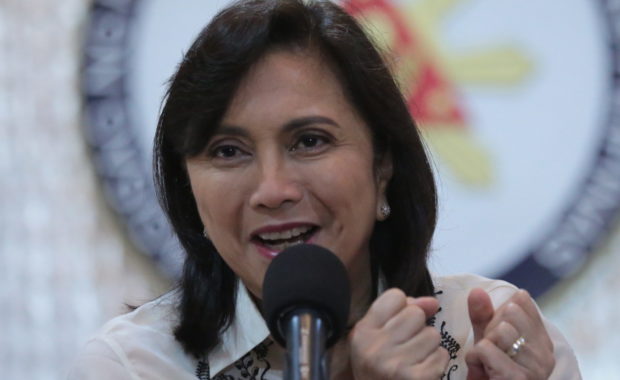MANILA, Philippines — Despite the COVID-19 pandemic disrupting the country’s economy and normalcy, Vice President Leni Robredo believes that the crisis gave Filipinos a rare chance to assess how societal systems work and for whom it works.
Robredo said during the 42nd National Conference of Employers on Monday that the country can reform systems by studying how the pandemic affected the lives of everybody, regardless of societal and financial status.
“What gaps need to be filled, urgently and with resolve? What steps do we need to take? The answers to these questions, of course, are complex and must take into account not only our economic reality but the entire socio-political context of today. But from where I sit, I see the crisis as a chance to reimagine the future,” Robredo said in her message.
“This reimagining begins with a reassessment not only of how our systems work but for whom it works. And the pandemic has brought a revelation that is central to the entire project of nation-building: Everything is interconnected,” she added.
According to her, when vulnerable families get sick, it is not only their communities who would suffer but also other communities as well. This, Robredo said, should spur the government to empower the vulnerable so that they would not be left so far behind and would be prepared for problems like the COVID-19 pandemic.
“When the most vulnerable get sick, the entire network of their linkages is affected: Their families and communities, their workspaces, our operations. Absent an income, our people will have little power to patronize businesses. Without proper digital infrastructure, the next generation of learners will fail to acquire the skills necessary to fill the workstations of the future,” Robredo explained.
“The imperative, then, is clear: The most vulnerable among us — and there are so many of them — must be looped into the cycle of empowerment and economic participation. If we are to rebuild our economy, we must rebuild it with inclusiveness as an animating philosophy — focusing our approach towards uplifting the lives of those in the margins,” she added.
Robredo stressed, though, that this would entail the private sector doing its job and re-establishing good governance and integrity within government.
“Now more than ever, we are called to intensify and scale up our efforts. Yes, we need to create jobs; we need new investments. For this to happen, we must re-establish the fundamentals – good governance, integrity, respect for the law, the stability of rules and regulations, and the sanctity of contracts,” she said.
“Beyond doing business, we are called to foster a world that truth-telling, honesty, and integrity remain imperative. It is through the stability that such values create that outcomes become predictable— that horizons become more visible, and that we are able to plan and execute our strategies for the future,” she added.
Since the COVID-19 pandemic arrived on Philippine shores, the government has resorted to several stringent lockdowns: first in March 2020, which involved Luzon, followed by several other granular lockdown areas most affected by the health crisis.
In Metro Manila and nearby areas, a two-week enhanced community quarantine (ECQ) was set up in August 2020, and just this late March 2021, the capital region plus nearby provinces of Bulacan, Cavite, Laguna, and Rizal were again placed under ECQ.
During those quarantine restrictions, many workers found themselves going into quarantine without jobs, as the lockdown measures only allow essential industries to operate.
The lack of income within some communities was evident as community pantries, an initiative where people donate food items that families may use to get through the day, spread like wildfire across Metro Manila and nearby provinces during the last ECQ period.
Also, the latest surveys from the Social Weather Stations (SWS) showed that while adult joblessness rates have eased down since the record-high 45.5 percent last July 2020, it has not returned to pre-pandemic levels.
SWS said that 12.2 million Filipinos are still without a job as of May 2021, for a 25.8 percent unemployment rate.
READ: SWS: Over 12M Filipinos still jobless as of May 2021
READ: ’Giving and taking in time of crisis:’ Community pantries sprout in NCR
As of Sunday, the country’s active COVID-19 case count is still at 57,679, with the total confirmed cases including recoveries and deaths reaching 1.359 million.
READ: PH logs 5,803 new COVID-19 cases; caseload now at 1,359,015 — DOH
